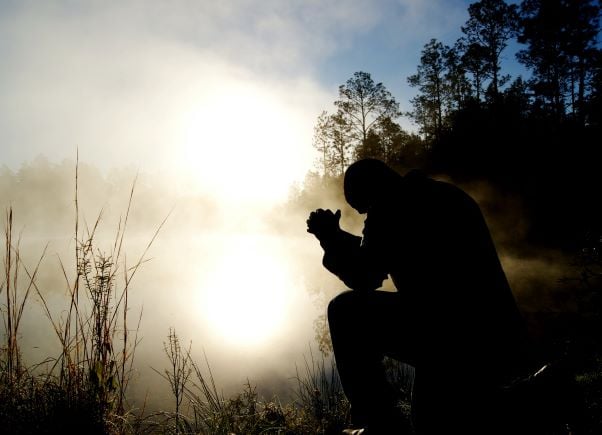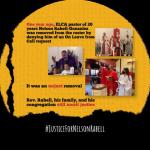Fasting for Earth is a form of resistance to oppression that we can practice as a spiritual discipline during Lent.

Ash Wednesday marks the beginning of the season of Lent. For Christians, it’s a time of introspection, penitence, and fasting in order to return to a closer alignment with God’s purposes. In the midst of continuing climate and environmental crises, we can hear Joel 2:1-2, 12-17 and Matthew 6:1-6, 16-21 as a call for fasting for Earth. These texts are assigned as part of the Revised Common Lectionary for Ash Wednesday in Year A. This is part of the EcoPreacher 1-2-3 series to equip preachers and congregations to engage the Bible through an ecological lens.
Eco-Exegesis
Eco-exegesis is a method of interpreting the biblical text through a green lens using the principles of ecological theology.
Joel 2:12-13
12 Yet even now, says the Lord, return to me with all your heart,
with fasting, with weeping, and with mourning;
13 rend your hearts and not your clothing.
Return to the Lord, your God, for he is gracious and merciful,
slow to anger, and abounding in steadfast love, and relents from punishing.
Biblical scholars believe that the Hebrew prophet Joel wrote during a difficult time in Israel’s history. It was a period when they were struggling to reconstruct the temple and their community after decades in exile. Joel uses strong imagery such as devouring locusts, “blood and fire and columns of smoke” (2:30), and the sun turning to darkness which hearkens back to the plagues God inflicted on Egypt. The message is clear: there will be consequences for those who have done violence to the people and the land if they do not heed Joel’s (and God’s) warning.
Locusts as maelstrom and metaphor

Swarming locusts eating all vegetation and stripping the land bare was a real phenomenon in biblical times and continues to this day. Triggered by unusually high rainfall (which, these days, is exacerbated by climate change), the insects swarm over vast spans of acreage ravaging landscapes and communities. Famine and starvation can follow in the swarm’s wake.
But for biblical writers, swarming locusts were also a metaphor for conquering tribes and invading armies that overrun a region. They consume food and resources, rape women and girls, and destroy homes and infrastructure. Today, the insatiable demand for natural resources, human labor, and financial wealth by capitalist enterprises can be compared to locust swarms. They mindlessly consume everything they see, giving insufficient thought to the devastation and suffering they leave behind.
But Joel asserts that it’s not too late for the community to turn away from their sins. Chapter 2 calls for blowing the trumpet to warn people about the coming of “the day of the Lord,” a time of divine judgment accompanied by “clouds and thick darkness” (2:2). Yet this warning is not intended to announce a foregone conclusion. Instead, it’s meant to compel people to return to God “with all your heart, with fasting, with weeping, and with mourning” (v. 12).
What might it look like to engage in fasting for Earth as a form of repentance and even resistance to the powers that mindlessly consume?
Matthew 6:16-18
[Jesus taught them in the Sermon on the Mount, saying:] ‘And whenever you fast, do not look dismal, like the hypocrites, for they disfigure their faces so as to show others that they are fasting. Truly I tell you, they have received their reward. 17But when you fast, put oil on your head and wash your face, 18so that your fasting may be seen not by others but by your Father who is in secret; and your Father who sees in secret will reward you.
Have you ever practiced fasting?
At first, the body feels pangs of hunger. But then it learns to self-regulate and burn stored calories. Fasting can cultivate gratitude for every morsel, every sip, as a gift from God. In addition, fasting can be a practice of liberation and resistance to oppression.
During a fast, the body consumes less calories, so it slows down. So, in a sense, fasting leads to a form of sabbath — resting from the relentless pressure to seek out and devour. In her book, Rest is Resistance: A Manifesto, Tricia Hersey explains how resting is essential for Black liberation because of the way Black bodies have been pushed to exhaustion and collapse by white supremacy and the “grind culture” of capitalism. She urges people to rest in order to disrupt these exploitative systems and reclaim their bodies, minds, and communities.

With this in mind, we can see that Joel’s and Jesus’s call for fasting is not about punishing or depriving the body. Rather, fasting is a spiritual practice that disrupts the narrative that we must either consume or produce in order to be of value in this world and loved by God. We can see fasting as a form of resistance to mindless consumption, colonialist greed, and capitalist engorgement.
Different ways to fast
Granted, some people are prevented from fasting from food because of health or nutritional reasons. But there are other ways to practice fasting from those things we thoughtlessly consume like a swarm of locusts. During Lent, we can practice fasting from social media. Or take a fast from buying anything that is not essential to you or your family’s basic needs. Lent is also an ideal season for a “carbon fast” to use less fossil fuels.
When fasting and rest become a movement of the many, we will not only experience God as “gracious and merciful, slow to anger, and abounding in steadfast love” (Joel 2:13), we will experience that grace, mercy, and love with each other as well.
1 Eco-Idea
The Eco-Idea is one succinct statement that tells us who God is and/or what God does in relation to Creation and how we should respond as people of faith.
God’s call to fast from relentless and mindless consumption is a liberative practice for both Earth and people that enables us to resist oppression and refocus our faith.
2 Eco-Questions
Eco-Questions are what we can ask to help a congregation draw out the implications of the Eco-Exegesis and Eco-Idea.
- What are spiritual practices of fasting and resting that our church can make space for during Lent?
- What kind of fasting is God calling us to practice this Lenten season? Can we offer different options for fasting that emphasize communal liberation rather than mere self-denial?
3 Eco-Actions
Eco-Actions are ways that a congregation might respond to the Eco-Idea and Eco-Questions. One of these possibilities may have salience for your ministry context.
1 – Carbon fast.
Visit the Climate Stewards website for ideas to engage a carbon fast with your congregation. https://www.climatestewards.org/resources/carbon-fast/
2 – Create space and support for fasting.
Create a meditation time and space for everyone – including the pastor. Organize a support group for those who fast during Lent to share their experiences and reflections.
3 – Start a book group to read Rest is Resistance.
Invite people to read Tricia Hersey’s book and practice fasting from “grind culture” during Lent. Read the Introduction and one chapter each week during the five weeks of Lent. (Consider ordering Hersey’s book from one of these Black-owned bookstores: https://www.elitedaily.com/p/22-black-owned-bookstores-you-can-order-from-online-22952386
Read also:
Soil + Breath = Life. Ash Wednesday Reflection
“You’ve got some dirt on your forehead”: Ash Wednesday reflection
Creation-centered Spiritual Practices Focus Our Lenten Journey
Churches Can Connect Faith and Creation Care for Lent
EcoPreacher 1-2-3 is a partnership between the Rev. Dr. Leah Schade and the Interfaith Center for Sustainable Development, publishers of Eco Bible, a Jewish ecological commentary on the Hebrew Scriptures. EcoPreacher 1-2-3 provides Creation-centered sermon preparation that is short, accessible, and based on a solid biblical foundation. To see other EcoPreacher ideas and to sign up to receive future EcoPreacher 1-2-3 installments, click here.

The Rev. Dr. Leah D. Schade is the Associate Professor of Preaching and Worship at Lexington Theological Seminary in Kentucky and ordained in the ELCA. Dr. Schade does not speak for LTS or the ELCA; her opinions are her own. She is the author of Preaching in the Purple Zone: Ministry in the Red-Blue Divide (Rowman & Littlefield, 2019) and Creation-Crisis Preaching: Ecology, Theology, and the Pulpit (Chalice Press, 2015). She is the co-editor of Rooted and Rising: Voices of Courage in a Time of Climate Crisis (Rowman & Littlefield, 2019). Her newest book is Introduction to Preaching: Scripture, Theology, and Sermon Preparation, co-authored with Jerry L. Sumney and Emily Askew (Rowman & Littlefield, 2023).
















